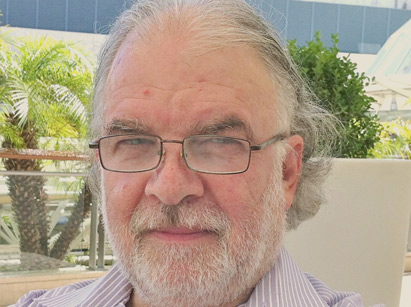By Claude Salhani - Trend:
Well-informed Saudi Arabian sources close to the country's intelligence services are raising the alarm that despite what many pundits believe, the terrorist group known as the Islamic State, is not funded by the desert kingdom, rather, its primary objective is the capture of the kingdom's vast oilfields and the mega-billion dollars they generate annually.
Indeed, capturing large swaths of territory in Syria and Iraq were convenient stepping stones and an important stage in the group's ultimate destination: Saudi Arabia. If the Islamic State is successful in overthrowing the Saudi Royal family and taking control of the country and its infrastructure, particularly the oil industry, they would be financially set forever.
Having started the implementation of their caliphate, IS has no choice now but to continue its long march through Arabia. In order to survive and prosper it knew from the outset that it had no choice but to set its sights on the ultimate prize: the oil fields of Saudi Arabia. It is in that direction that the battle for control of the world's largest oil fields is currently heading.
Islamic State -- which has its origins in al Qaeda - knows fully well that in order to sustain itself as a viable and lasting religious, political, economic and military entity in the region, it has to follow the same objectives established by al-Qaeda when Osama bin Laden broke off his relations with the Saudi monarchy and vowed to bring down the House of Saud.
Bin Laden's ire at the Saudi monarchy stemmed from the fact that the Saudi king had invited the American military to use Saudi Arabia as a staging area to build up enough forces in order to take on Saddam Hussein after Iraqi troops occupied Kuwait in August 1990. Bin Laden had objected to the presence of "infidels" in the land of the two holy mosques, and asked the Saudi king to allow his outfit to tackle Saddam Hussein's troops.
And just like al-Qaeda then, the Islamic State today, are cognizant to the fact that only with Saudi Arabia secure as part of the Caliphate, and with the oil fields under their control, can they begin to feel somewhat secure. Which is why the group's next logical step is, twofold.
First, to capture and secure the most important country in the Muslim world: Saudi Arabia.
If the battle for Syria and Iraq attracted tens of hundreds, (some say tens of thousands) of young Muslims, the battle for control of Islam's two holiest sites, Mecca and Medina, are very likely to attract many more fighters into the ranks of the Islamic State.
And second, to take on the United States, the one remaining superpower that can impede its march on the oilfields of Saudi Arabia, and ultimately on the rest of the Gulf.
After much hesitation it now appears that the Obama administration has come around to realizing the true danger posed by IS. Washington, along with some of its NATO allies, are now formulating a plan to defeat IS.
However, it may be wise to point out that Washington's track record in dealing with Middle East problems has not been something to crow about, to say the least. As a point of reference one needs only to mention Iraq and Afghanistan; prime examples of how not to do things.
Additionally, if the U.S. can defeat IS militarily, any victory would only be temporary as eventually, U.S. troops will pull out and the remnants of IS would emerge from their respective hiding places, as they did when Saddam fell. Indeed, what a U.S. intervention will accomplish through its massive air bombing campaign will be to garner even greater animosity directed at the West in general and at the United States in particular. It's all déjà vu.
The one power that can effectively move against IS in a manner that would appear legitimate to other Muslims is Saudi Arabia, as point out Nawaf Obaid a fellow at Harvard's Belfer Center for Science and International Affairs and Saud al-Sarhan, research director at the King Faisal Center for Research and Islamic Studies in an opinion piece published in the New York Times Sept. 9. The two writers dispute the widely believed notion that Saudi Arabia created IS and is funding it. "Saudi Arabia is not the source of ISIS, it's the group's primary target," write Obaid and al-Sarhan.
What makes IS powerful today is the fact that they laid out there military strategy based on where the oil fields are located. The fact that they went after northeast Syria and northern Iraq are not coincidental by any means. Islamic State may be ruthless and brutal, however they are first and foremost a terrorist organization with an astute business sense.
The capture of the oil wells in Syria and Iraq has made this group financially self-sufficient. But its now all or nothing.
As the two Saudi writers adequately note: "The Saudi leadership has a unique form of religious credibility and legitimacy, which will make it far more effective than other governments at delegitimizing ISIS' monstrous terrorist ideology."
Claude Salhani is a political analyst and senior editor with Trend Agency.
Follow him at on Twitter @ClaudeSalhani






